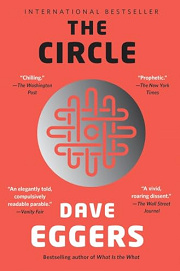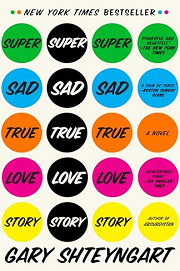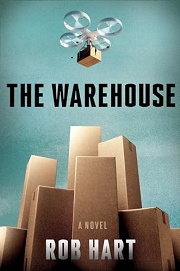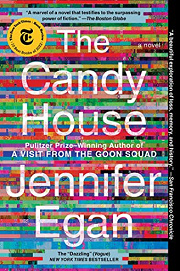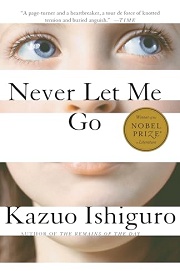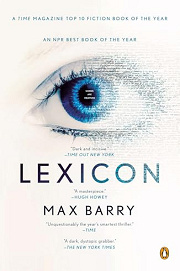Share your thoughts in a quick Shelf Talk!
The Circle by Dave Eggers
A bright young recruit joins a tech giant promising connection and transparency—only to find the cost of perfection is total exposure. Sharp, timely, and unsettling, it asks how far we’ll go to be seen. The Circle is a chilling, compulsively readable cautionary tale for the always-online age.
Have you read this book? Share what you liked (or didn’t), and we’ll use your answers to recommend your next favorite read!
Love The Circle but not sure what to read next?
These picks are popular with readers who enjoyed this book. Complete a quick Shelf Talk to get recommendations made just for you! Warning: possible spoilers for The Circle below.
In The Circle, did you enjoy ...
... biting satire of a surveillance-obsessed, rating-driven culture and its effect on intimacy?
Super Sad True Love Story by Gary Shteyngart
If the corporate mantras and smiley-faced coercion that draw Mae into transparency—“Sharing is caring,” the ceaseless zings, the performance metrics—hooked you, you’ll love the satirical sting of Super Sad True Love Story. Like Mae’s world of PartiRank and SeeChange, Shteyngart’s near-future America gamifies worth through social scores and always-on streams, pushing its characters to curate every moment. As Mae embraces the Circle’s public self at the cost of Mercer and Annie, here you’ll watch Lenny and Eunice struggle to love under the glare of engineered validation, where privacy is passé and your feed decides your fate.
... a corporate-controlled near future where convenience quietly erodes freedom?
The Warehouse by Rob Hart
If the Circle’s glossy benevolence—health bracelets, campus perks, and SeeChange under the guise of safety—chilled you as it tightened control over Mae’s life and even hunted Mercer, The Warehouse channels that same corporate creep. Cloud, a mega-corp, promises stability and comfort while swallowing towns and tracking workers’ every move, much like Eamon Bailey’s smile-softened surveillance. As Mae chooses the company over her relationships, you’ll see Zinnia and Paxton navigate a brand-first world where convenience is a leash and the price of opting in is your autonomy.
... the seductive promise of total sharing and the loss of privacy via mind-linked tech?
The Candy House by Jennifer Egan
If Mae’s leap to "going transparent," the Circlers’ chants of “All that happens must be known,” and the SeeChange panopticon fascinated you, The Candy House is a perfect next step. Egan imagines a technology that lets people upload and share their memories—an extension of what the Circle sells Mae: frictionless connection at the cost of secrets. As the Circle turns private moments into public property, Egan’s characters grapple with similar bargains: radical openness, data permanence, and the haunting impossibility of forgetting once everything is shared.
... the chilling normalization of exploitation disguised as social good?
Never Let Me Go by Kazuo Ishiguro
If the moral sleight of hand behind the Circle—Eamon Bailey’s genial pitches, Tom Stenton’s ruthless spectacle with the shark, and Mae’s defense of surveillance as civic duty—stuck with you, Never Let Me Go distills that dread. Ishiguro shows a society that calmly justifies an atrocity as necessary and beneficial, much like the Circle frames SeeChange and Demoxie as progress. As Mae rationalizes betraying Mercer and Ty for the platform’s vision of the public good, Kathy, Ruth, and Tommy navigate a world where cruelty is made palatable by euphemism and policy.
... a protagonist seduced by a powerful organization’s rhetoric and tools of manipulation?
Lexicon by Max Barry
If watching Mae evolve from wide-eyed recruit to true believer—embracing slogans like “Secrets are lies” and wielding the Circle’s tools against dissent—was gripping, Lexicon offers that same uneasy thrill. Emily Ruff is recruited by a clandestine school that weaponizes language to control minds, and her loyalty and ethics blur as she masters the craft. As Mae prioritizes the platform over friends like Annie and Mercer, Emily learns how persuasive systems turn people into instruments—a propulsive, twisty mirror to the Circle’s seductions.
Unlock your personalized book recommendations! Just take a quick Shelf Talk for The Circle by Dave Eggers. It’s only a few questions and takes less than a minute.
